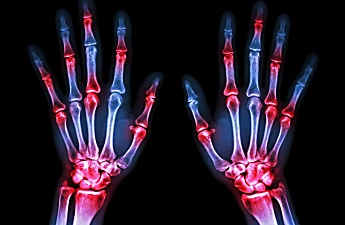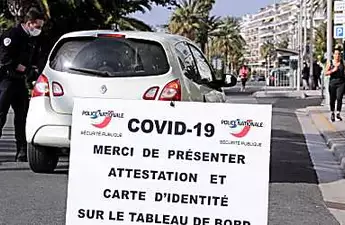Issued on: Modified:

ADVERTISING
Jerusalem
The Jewish holiday of Passover has long inspired intense debate, with favourite topics including whether Moses actually parted the Red Sea or if the Ten Plagues were an ethical response to enslavement.
But with the COVID-19 pandemic raging, a previously unthinkable question has consumed Jewish debate less than a week before the holiday starts: is it permissible to hold the traditional Seder meal over Zoom?
The videoconferencing application has emerged as an essential tool during a crisis that has confined people across the globe in their homes.
But the app and similar tools that have connected people through the pandemic have created divisions among Jewish leaders.
Passover, an eight-day holiday that marks the Jewish people's biblical exodus from Egypt, begins Wednesday evening with a Seder, one of the most important events of the year for Jews.
A typical Seder involves large gatherings of relatives crowded around a table, who recount the Exodus story through song and prayer while sharing a multi-course meal.
- Are digital Seders kosher? -
Israel, which has more than 6,500 confirmed COVID-19 cases, has banned people from straying more than 100 metres from their homes except for essential activities.
A wealthy benefactor floated the idea of donating 10,000 computers to confined elderly people, allowing them to join loved ones in digital Seders.
He asked a group of Orthodox rabbis from the Sephardic tradition, which is rooted in southern Europe and North Africa, to assess if the plan was consistent with halacha, or Jewish law.
Rabbi Rephael Delouya, one of the 13-member panel that studied the issue, told us at France24 that the answer was "easy".
Digital Seders were permissible to alleviate loneliness that isolated elderly people were experiencing during the pandemic.
"Loneliness can lead to a weaker mind, which causes lower immunity," Delouya said.
"Mental health and physical health are connected."
The Sephardic rabbis also issued a formal ruling, or posek, declaring that conferencing apps like Zoom could be used in an "emergency" to aid the "elderly" and the "sick".
It could "give them motivation to continue fighting for their lives and to prevent them from falling into depression" the ruling said.
Delouya said the decision was based on guidance from "wise" Sephardic leaders, who more than 50 years ago approved the use of certain forms of electricity, like an oven light, on Jewish holidays.
They were later overruled by Rabbi Avrohom Yeshaya Karelitz of the Ashkenazi tradition of eastern Europe, whose guidance against using electricity on holidays prevailed across the Orthodox world.
- 'I don't bend' -
Israel's chief rabbis -- the Ashkenazi leader David Lau and the Sephardic Yitzhak Yosef -- pushed back against the videoconferencing decision.
"Loneliness is painful and we must respond to it, perhaps by having a video conference on the eve of the holiday before it begins, but not by desecrating the holiday," they wrote.
An expert in Orthodox movements at Israel's Bar Ilan University, Kimmy Caplan, told us at France24 that the debate hinged on tensions Judaism has faced previously when Orthodox rabbis confront social challenges.
"Overall, the Orthodox stance on many issues is that we don't (adjust) for social issues... when they contradict the letter of the law," Caplan said.
The typical response from Orthodox rabbis is, "I don't bend my legal system because of a social situation," he added.
A similar tension between social reality and Jewish law divided Orthodox and Conservative leaders in the US in the 1950s.
As American Jews moved to suburbs, and therefore further away from their synagogues, it became imperative for many to use cars on Shabbat.
Conservative rabbis decided the need to preserve Jewish life justified the use of cars, while Orthodox rabbis held firm in opposition, Caplan said.
- 'Turning point' -
Jerusalem resident Sabrina Castro-Moise told us at France24 that she will use videoconferencing on Seder night next week to connect with her 76-year-old mother, who lives nearby.
"We spend all the holidays together," she said.
Zoom will ensure her mother is not alone on Passover, "while being consistent with what (the panel of Sephardic) rabbis said", she added.
Michael Lev, a 44-year-old businessman agreed that the decision by the rabbis to allow Zoom was "humane".
"What's the purpose of the (Seder) ritual if you practice it alone?" he said.
Israeli Prime Minister Benjamin Netanyahu, who is in quarantine after his health minister tested positive for COVID-19, urged the country late Wednesday to only have Seders "with the nuclear family that is with you now".
Passover, he said, could be a "turning point" in Israel's battle against COVID-19 if precautions are followed.


![30 Strict White House Rules The First Lady Has to Follow [Pics] 30 Strict White House Rules The First Lady Has to Follow [Pics]](https://images.outbrainimg.com/transform/v3/eyJpdSI6ImRkZTY1ZDk4MmRhNjkxZTAxNmIyMGI2MDQ1MDMxNTgxN2NhNjc4MDU0NjA5NjUxZGQxMWI3NTVlZjE2NjgzMTQiLCJ3IjoyMzAsImgiOjE1MCwiZCI6MS41LCJjcyI6MCwiZiI6NH0.webp)






![People Have To Watch These Famous, Unbelievable Scened More Than Once [Pics] People Have To Watch These Famous, Unbelievable Scened More Than Once [Pics]](https://images.outbrainimg.com/transform/v3/eyJpdSI6IjMzZDA2NjYxYTljZWZmOTdiYTBjZWIxODI1Njk1NWQwNDU2MjkxODM5ZDU4OGI3ZjkyNjQ0NDVlOGQwN2Q5ZWYiLCJ3IjoyMzAsImgiOjE1MCwiZCI6MS41LCJjcyI6MCwiZiI6NH0.webp)
![[Photos] No Its Not Photoshop, Look Closer At This College Football Sign [Photos] No Its Not Photoshop, Look Closer At This College Football Sign](https://images.outbrainimg.com/transform/v3/eyJpdSI6IjczNTYxNzEyNTI2ZDEwZjAyZGI1ZjUxYTAyNGQzYWU5Njg1NTlhNGJkYjc3ZTRjMDRkNjI3NjdlYjE3MWYwNjQiLCJ3IjoyMzAsImgiOjE1MCwiZCI6MS41LCJjcyI6MCwiZiI6NH0.webp)


ReplyDeleteThis professional hacker is absolutely reliable and I strongly recommend him for any type of hack you require. I know this because I have hired him severally for various hacks and he has never disappointed me nor any of my friends who have hired him too, he can help you with any of the following hacks:
-Phone hacks (remotely)
-Credit repair
-Bitcoin recovery (any cryptocurrency)
-Make money from home (USA only)
-Social media hacks
-Website hacks
-Erase criminal records (USA & Canada only)
-Grade change
Email: cybergoldenhacker at gmail dot com